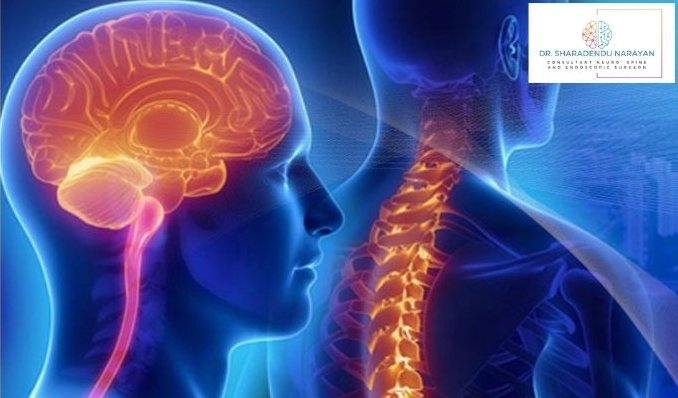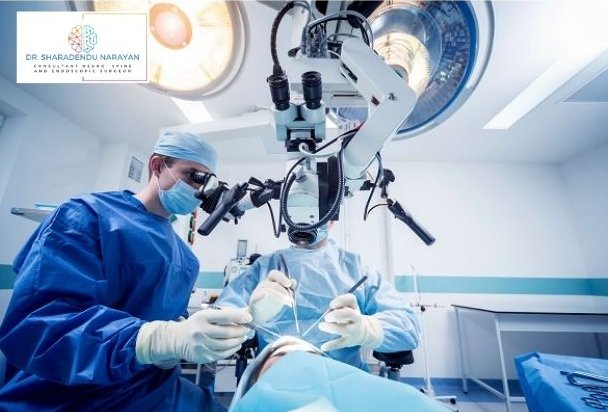Brain & Spine Trauma Surgeries
Best Brain and Spine Trauma Surgeries by Dr. S. Narayan

Understanding Spinal Injuries and Treatment Options by Dr. S Narayan, Spine Surgeon in Jamshedpur
How Do Spinal Injuries Occur?
What is a Spinal Cord Injury?
When are CT or MRI Scans Needed?
Can Spinal Fractures be Treated Without Surgery?
Is Bed Rest Necessary for Spinal Injury Patients?
Surgical Options for Spinal Fractures
Some patients might need surgery to fix spinal fractures. This can involve using titanium plates, rods, and screws. Minimally Invasive Spine Surgery (MISS) is an option for some fractures. Patients with paralysis almost always need surgery to decompress the spinal cord and stabilize the spine.
Chances of Recovery from Paralysis
If paralysis is incomplete, there is hope for improvement within 3 months to a year. However, if paralysis is complete at the time of injury, recovery is unlikely. Surgery in these cases aims to ease nursing care, prevent bed sores and pneumonia, and enable early mobilization with a wheelchair. Despite ongoing research worldwide, there is still no effective treatment to help patients with complete paralysis walk again.
For expert spine care, contact Dr. S Narayan, a leading spine surgeon in Jamshedpur.

Understanding Brain Trauma by Dr. S Narayan, Brain Surgeon in Jamshedpur
What is Brain Trauma?
Brain trauma refers to any injury affecting the skull or brain. Such injuries can be severe and require immediate medical attention. Common causes include falls, car accidents, sports injuries, and physical assaults. Symptoms can range from mild to severe, depending on the injury. It is crucial to seek help from Dr. S. Narayan, a top Brain Surgeon in Jamshedpur, if you experience any head injury symptoms. Timely treatment can prevent complications and improve outcomes.
Intraparenchymal Hematoma
Intraparenchymal hematoma, also known as intracranial hematoma, occurs when blood accumulates within the brain tissue. Causes include stroke, ruptured blood vessels, congenital vascular abnormalities, high blood pressure, and other conditions affecting brain blood flow.
This type of hematoma typically results from a ruptured cerebral artery or a traumatic injury like a car accident or fall. Blood may pool within the brain tissue or under the skull, increasing pressure on the brain. While some head injuries might seem minor, leading to brief unconsciousness, intracranial hematomas can be fatal. Immediate medical attention, often requiring surgical drainage, is essential to relieve this pressure.
What is a Subdural Hematoma?
A subdural hematoma is a blood clot located outside the brain, usually caused by severe head injuries. This condition can lead to life-threatening bleeding and increased brain pressure. Some subdural hematomas resolve on their own, while others need surgical drainage.
In this condition, blood gathers between the brain’s protective layers. The bleeding occurs under the skull but outside the brain, creating significant pressure on the brain and causing symptoms like unconsciousness. Without treatment, subdural hematomas can be fatal.
What is an Extradural Hematoma?
An epidural hematoma (EDH) is a collection of blood between the dura (the brain’s outer layer) and the skull. It often results from head trauma, typically involving a skull fracture and arterial bleeding from a ruptured middle meningeal artery.
EDHs are usually biconvex in shape and can cause a mass effect, leading to brain herniation. While skull sutures typically limit the spread of EDHs, venous sinuses may not. CT and MRI scans help evaluate EDHs. With prompt removal of the blood clot (or conservative management for small clots), the prognosis for EDHs is good.
What is a Traumatic Brain Injury?
A traumatic brain injury (TBI) usually results from a violent blow to the head or body. TBI can also occur when an object penetrates brain tissue, such as a bullet or a skull fragment.
Mild TBIs may cause temporary brain cell loss, while severe TBIs can result in bruising, tissue tearing, bleeding, and other physical brain damage. Brain injuries often come with head injuries, which may or may not include neurological deficits. Dr. S. Narayan, an expert neurosurgeon in Jamshedpur, specializes in treating TBIs and can provide expert care.
For expert treatment of Brain and Spine Trauma Surgeries contact Dr. S. Narayan, the best Brain Surgeon in Jamshedpur.
